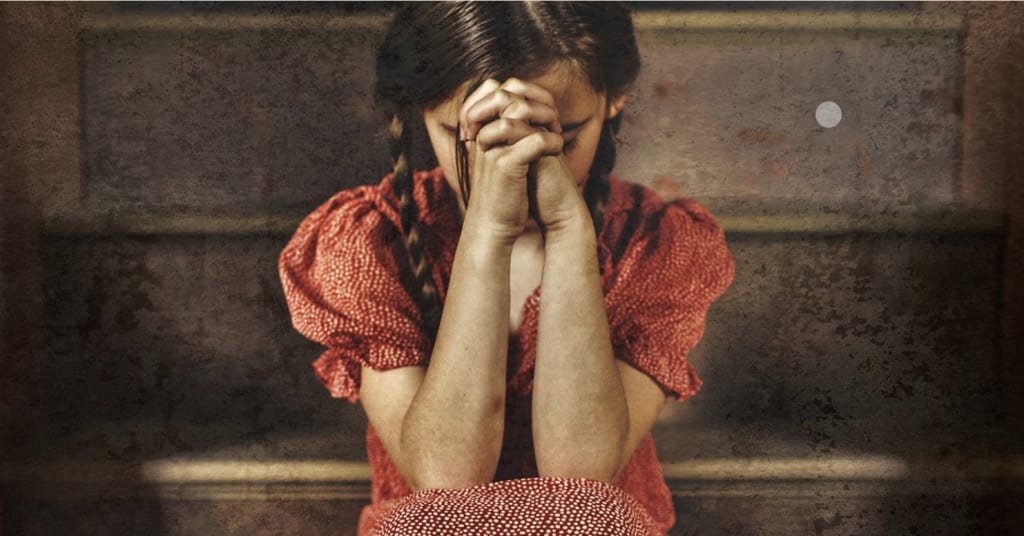
The Orphan is an enigma. As the representative of a kind of numinous loneliness, the orphan is both special and outcast. There is a holiness to her exiled state and once redeemed, representative of the true embodiment of the Self. The Orphan archetype is of great significance to the work of C.G. Jung and archetypal psychology and its appearance marks an important moment on the road to the individuated Self which can be symbolised through the “numinous character of the child”.
It took a long time for the orphan to appear in my dreams and even longer it seems to redeem her, but when she arrived she was bathed in golden light. Ushered into the palace she was granted a special seat at the table and given the gift of a huge family portrait, larger than my small family and my small exiled self had ever known.
The orphan of folk and fairytale is always on a journey to find her true place in the world and more often than not, through much trial and false belonging, she has to create the new world for herself. The leaving of home and breaking with her established group or family of origin often precipitates a long period of exile and deep loneliness that can feel at times impossible to endure. Unbelonging can seep into one’s soul and attach itself to ones identity in such a way that no matter who opens their arms, be it a job, a lover, a friend or coffee shop, one is perpetually outcast and home is forever a million miles away. But for the seeker of depth, the orphan offers a special kind of promise and a deep magic if we can sit with that loneliness long enough and cease being tempted to cling to the ego’s fantasies of false belonging. A kind of transcendence emerges where the orphan becomes numinous and whole and belongs to both no one and the whole world simultaneously.
Having spent years unravelling incestuous parental complexes and the havoc they have played in my relationships the arrival of the orphan in my dreams was a welcome sign and the broad smile on her face as she was ushered into the room, though masking the trials, loneliness and exile that had lead her to this point, was indicative of the triumph of the Self. Marion Woodman, whose work with assisting women through individuation and breaking unhealthy attachments to parental figures set the arrival of the orphan as crucial to the recognition of ourselves as a seperate and whole Self. “Individuation begins with the painful recognition that we are all orphans. And the liberating recognition that the whole world is our orphanage.” (Woodman, 1992. 354)
Ann Ulvanov once wrote “as instincts are to the body so archetypes are to the psyche.” When the archetypal symbol makes it way via your dreams to the level of consciousness the psychic resonance can be as powerful and full bodied as an instinctual one and if integrated fully into the psyche, as healing as any medicine.
For Jung the whole archetypal realm of the child “means something evolving towards independence. This is cannot do without detaching itself from its origins: abandonment is therefore a necessary condition, not just a concomitant symptom.” Appearing often out of an inner tension or conflict of the opposing forces of isolation and potential, the orphan archetype, as a bringer of light, may indeed represent a new consciousness, that in Jung’s view “is the equivalent to being all alone in the world.” (Jung, 1959.168)
Our new found at-one-ment in the world far from being a place of loneliness and depression becomes via the redemption of the orphan from isolation to possibility, a source of increasing independence and great personal potency. We become increasingly accepting and open to all of the light and dark guests in our house.
The Guest House
This being human is a guest house.
Every morning a new arrival.
A joy, a depression, a meanness,
some momentary awareness comes
An unexpected visitor.
Welcome and entertain them all!
Even if they’re a crowd of sorrows,
who violently sweep your house
empty of its furniture,
still treat each guest honourably.
He may be clearing you out
for some new delight.
The dark thought, the shame, the malice,
meet them at the door laughing,
and invite them in.
Be grateful for whoever comes,
because each has been sent
as a guide from beyond.” – Rumi.
REFERENCES:
Jung, C.G. (1959) The Archetypes and the Collective Unconscious. Princeton University Press.
Punnet, A. (2014) The Orphan, A Journey to Wholeness. Fisher King Press. U.K.
Turner, T. (2017) Belonging. Her Own Room Press. British Columbia.
Woodman, M. (1992) Leaving My Father’s House. Shambhala Publications. Boston.
About the Creator
Delaney Jane
I write teach and study religion, myth, depth psychology and dreamwork all in pursuit of the symbolic life.
http://thissymboliclife.wordpress.com






Comments
There are no comments for this story
Be the first to respond and start the conversation.